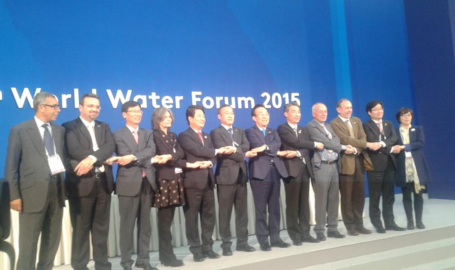
Cities and regions from all over the world, gathered at the World Water Forum on the occasion of the 4th International Conference of Local and Regional Authorities on Water in Gyeongju (Republic of Korea) on 13 and 14 April, reaffirmed the crucial need for the international community to adopt Goal 6 of the Sustainable Development Goals, which aims to ensure access to water and sanitation for all through sustainable and inclusive management.
Local and regional authorities also highlighted the need for the new Post-2015 Development Agenda to be based on international cooperation among local and regional authorities, especially through financing partnerships between local and regional governments in developed and developing countries.
As such, they reaffirmed the need to continue to support the Istanbul Water Consensus, as a tool for sharing, monitoring and expanding the actions of local authorities around the world, as part of an integrated and participatory approach. To date, over 1,150 cities from 58 countries have committed to the Consensus.
Co-organized by United Cities and Local Governments, ICLEI, GWOPA (the Global Water Operators’ Partnerships Alliance), the World Water Council and the Daegu Gyeongbuk Development Institute, the International Conference has seen the participation of local elected officials, notably from France, Niger, Ghana, Mexico, Colombia, Brazil, Turkey, Lebanon, the Philippines and South Korea. UN-Habitat, water operators and representatives from academia and the private sector also participated in the Conference.
During the discussions, the elected hosts of the Conference, Mr. Youn-gjin Kwon, Mayor of Daegu, and Mr. Gwan-yong Kim, Governor of Gyeongbuk, jointly welcomed the mobilization and participation of local and regional representatives from around the world. They also emphasized that uncontrolled urbanization and climate change were aggravating factors for good water management. Further, the Korean Interior Minister reaffirmed the need to respect the fundamental right of universal access to safe drinking water.
Representing the local authorities and associations united in UCLG, Nader Ghazal, Mayor of Tripoli, Lebanon, recalled the content of the Declaration of the Founding Congress of UCLG in 2004, which had already placed water at the heart of development issues. He expressed that coordination between national and local levels was essential. “Poor coordination and a lack of dialogue put water management in danger.”
In a video message, the Executive Director of UN-Habitat, Joan Clos, recalled that the issue of water is central to the development agenda, and closely connected to urbanization. “Good coordination between local authorities and water operators is the magic formula for good, integrated management.”
The representative of the World Water Council, Guy Fradin, a member of the World Water Council’s Board of Governors, launched a strong message in favour of water management by local authorities. The efforts undertaken in Istanbul, Mexico City and Marseille are bearing fruit and are intensifying each year, he said. “Local authorities are the only actors able to support this work; they are the only legitimate and competent institutions and are best placed to ensure coordination between all stakeholders.”
Finally, elected officials were able to highlight the implementation of the Istanbul Water Consensus at the local level across four continents, and present their solutions. Jean-Marie Tétart, Mayor of Houdan, France, cited policies and tools put in place to enhance effectiveness, profitability and cooperation, giving the example of the remote readings that helped to prevent leaks and increase water conservation. Further, in accordance with the Oudin Law, 1% of revenue is donated to their sister city in Senegal under decentralized cooperation.
Local leaders unanimously recognized the vital role that local authorities play in ensuring coordination with civil society and in launching mobilization and awareness campaigns on water management. They also emphasized the importance of collaboration between urban and rural areas.
The conference resulted in the adoption of the “Final Document on Water Action for Sustainable Cities and Regions” by local and regional authorities. The document reveals the commitment and strategy of local and regional authorities and calls on national governments to strengthen decentralization and the institutional capacities of local authorities, as well as to support decentralized cooperation through innovative financial mechanisms.
For more information:
- Please visit the UCLG website related to Water and sanitation
- World Water Forum










